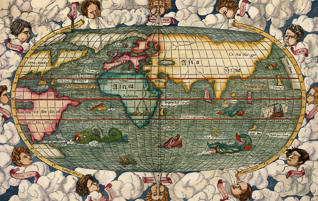EHGO Team
The map through the prism of a worldly periodical
Thesis defense – Matthieu PICHON
Welcome to the doctoral students who have joined Géographie-cités!
Constructed landscapes: form and memory
Towards a gender inclusive cityscape
Thesis defence – Émilie Dreyfus
Conference War Landscapes
Barry Lawrence Ruderman Conference on Cartography
Diego Arango López, visiting professor at Géographie-cités

Epistemology and History of Geography (EHGO) (previously Centre de géohistoire) has existed under its new name since 1987. It is the only CNRS team dedicated to these fields. It has participated in numerous interdisciplinary initiatives since the 1970s and has been in constant dialogue with other historians and epistemologists in the humanities. Since the 2000s, it has opened its scope to broader “savoirs of space,” and includes efforts of architects and urban planners, engineers, landscape architects, and developers, among others. It has also opened up space for geohistory and historical geography.
The EHGO team has developed a highly specialized knowledge, nourished by all the transformations of historiography and the epistemology of the fields that are related to it. It has always promoted or encouraged collective work. While it strives to bring to light the development of geographical knowledge, it does not neglect the social history of scholars or political or cognitive contexts. It emphasizes a long history of objects and the shaping effects of mediations (maps, texts, diagrams, categories…) and political, social, and institutional stakes.
Thematic
The working group, “Writings on Geography, ” intends to refocus its work on a few strong questions: that of the “geographical” by asking to what extent and to what point it can constitute a “common” identified as such; whether the “poetics” of places, itineraries, landscapes, etc., can be federated under a “poetics of space” formula or the formula is merely convenient; what practices are at work in scholarly literary criticism when using themes that for geographers have a “family resemblance.” In addition, the working group intends to develop an approach to geographers’ writings and geographic genres which constitutes a symmetrical test of the work undertaken, here and elsewhere, on (perhaps misnamed) “literary spatialities.”
The working group engaged with the “Atlas-form” wishes to continue exploring this subject along several lines. For example, the history of this form in the field of geography is still largely unwritten, especially with regard to its origins, but also in terms of the persistence of the formula of composite collections and atlases during the modern and contemporary eras, a persistence that should lead to a reorganization of the historiography and a re-evaluation of the place of composite forms of cartographic writing. In the same way, the circulations and the cognitive and plastic potentialities of the atlas-form in modern and contemporary scientific, literary and artistic cultures remain to be explored in a broad way.
The EHGO team proposes to continue and extend its analysis of the circulation of knowledge, by approaching circulations as “moments” of knowledge creation. It will not only pursue the investigation of interdisciplinary exchanges (primarily between the field of geography and other social sciences, although also further afield) but will also continue in parallel to question international exchanges.
The members of the team will extend their examination of the exchanges between scientific knowledge and knowledge of action, through studies focused on the colonial situation, by shifting the collective investigation to the turning point of decolonization, and on the administration of territories over time. One working group particularly wishes to investigate the political trajectories of geographers, especially in the second half of the twentieth century; a subject that is almost always studied in a monographic way without addressing the general tendencies of the politicization of geographers influenced by conjunctures and circumstances that have not only an internal dynamic, but also a morphology and a strong heteronomy.
The second axis of research will focus on the fabrication of spaces over time, paying particular attention to the way in which they are linked to the re-elaboration of the understandings of space, born of the encounter between practices and savoirs. Three geographical elements will be privileged in this perspective of historical geography: roads and networks and grids.

David Rumsey (map from personal collection)
EHGO Team Members’ recent research initiatives
Emmanuel de Martonne Corpus. Phase 2
Dates: 2021 - 2022
Phase 2 of the project, within the framework of Digital Humanities, promotes a second body of archives by geographer Emmanuel de Martonne (1873-1955) consisting of 6 field notebooks and 400 glass plates. As for phase 1, phase 2 analyzes, documents, archives and disseminates the archives according to a threefold problematic: that of the geographical heritage of textual and iconographic sources, that of Open Science and that of innovation in Human and Social Sciences.
DESIGNSHS. Graphic Design, Research, and Social Science Heritage
Dates: 2021 - 2025
The program aims to study and valorize the archives of the laboratory of cartography, then of graphics, directed by Jacques Bertin from 1954 to 1985 (EPHE then EHESS). The aim is to explore, from this major source, the relationships that were established between graphic creation and research in the human and social sciences in the second half of the 20th century.
Circulation, geopolitics and the construction of knowledge about the world from the straits. The case of a world passage, the Strait of Magellan
Dates : 2020 - 2022
The project analyses the role of straits in the organization of political spaces on a global and regional scale in the modern period, and in particular examines the role of the Strait of Magellan in the processes of circulation of knowledge and narratives that linked Europe to the American continent. Other straits are studied in a comparative way (Gibraltar, Bosphorus, Malacca).















